How to Find Semantic Keywords in WordPress
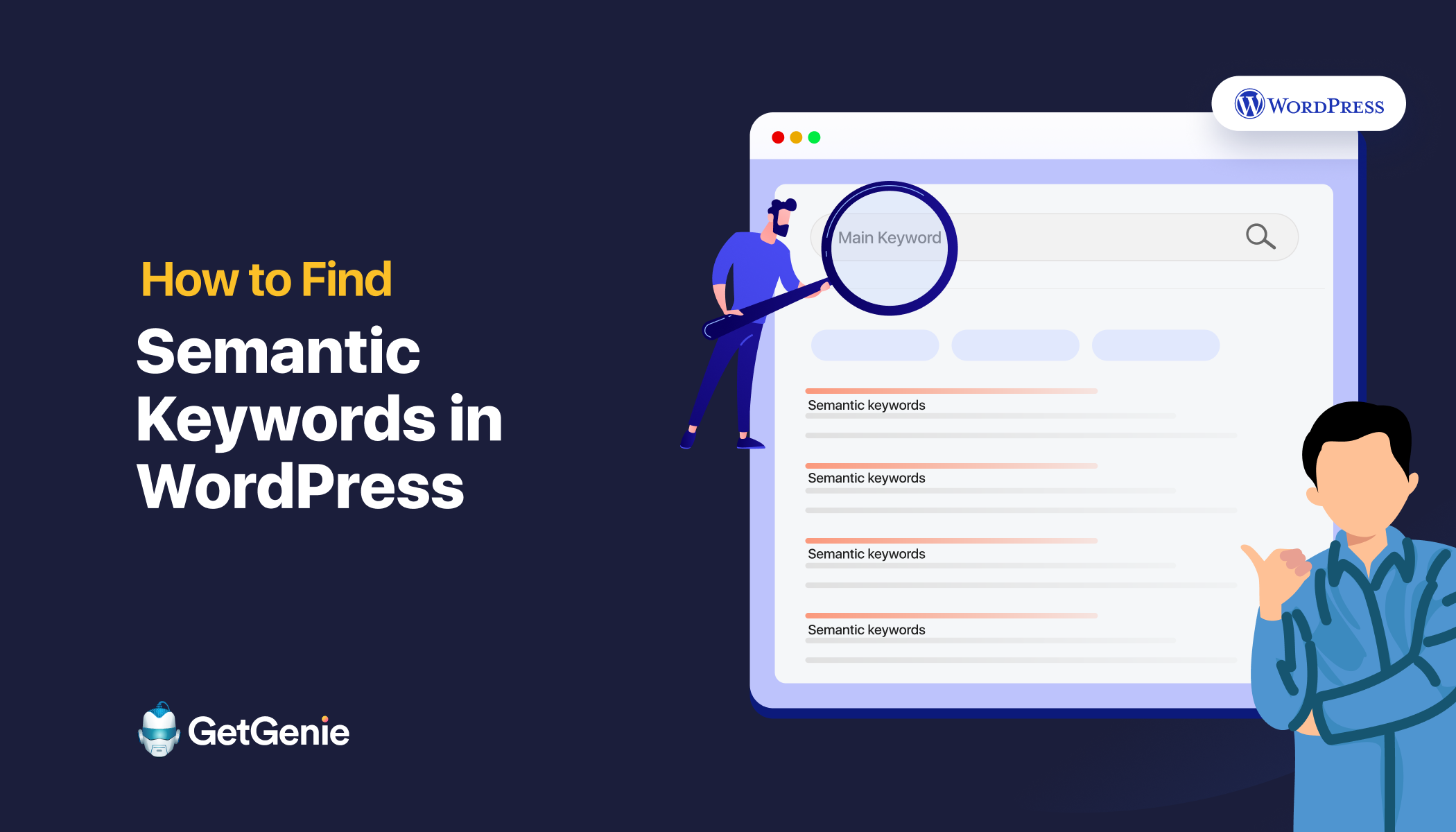
In a nutshell:
Beyond just exact keywords, “semantic keywords” are related terms that help Google truly understand your content’s meaning. We’ll show you why these smart keywords are crucial for better SEO, and how you can find them for your WordPress site. This includes both brainstorming manually and using smart AI tools.
Google and your readers get what you’re talking about more clearly when you sprinkle in related terms along with your main keyword. That’s where semantic keywords come in. It’s just simple! These are relevant search terms that bring in the right audience at the right time.
In this guide, we’ll show you how to find semantic keywords for your WordPress site, from using Google suggestions to AI tools that do the heavy lifting.
Zacznijmy!
What are semantic keywords?
Semantic keywords are words and phrases that are conceptually related to your main keyword or topic. For example, if your main keyword is “indoor plants”, the semantic keywords for it would be air‑purifying houseplants, low‑light plant care, succulent watering tips, lemon tree indoors, pothos growth conditions, etc. You just have to weave these terms into your content naturally. It’ll signal to Google that your content covers practical issues like maintenance and health benefits, making your content more comprehensive and helpful.
Are semantic keywords and LSI keywords the same?
The term “LSI keywords” (Latent Semantic Indexing) is often used interchangeably with semantic keywords. But it’s important to note that Google doesn’t use LSI in its ranking algorithms.
Google’s search advocate, John Mueller, tweeted in 2019 and clarified this fact.
However, the concept of using related terms to provide context and demonstrate topical authority is still highly valuable for SEO.
Importance of semantic keywords on SEO
If your content matches users’ intent, it’ll hit the mark in the SERP. And by incorporating semantic keywords, you’re essentially providing search engines a more comprehensive picture of your content’s subject matter.
Search engines are very smart. For example, Google now analyzes the relationships between words, synonyms, and related concepts to grasp the overarching topic. It also understands users’ underlying search intent.
So, when your keywords match with searchers’ relevant queries, Google pushes your content as relevant content. However, depending on how well you have covered the point or answered the query, you will get a rank on the SERP. (Competition matters)
Moreover, semantic keywords boost positive user experiences by delivering more accurate and helpful results. So it’s important to craft content and update old ones from various angles, using semantic keywords. It signals expertise and authority.
How to find semantic keywords
We’ll explore two effective approaches to discover semantic keywords: a manual method and using AI tools.
Manual analysis and brainstorming
Think broadly about your topic: If your main keyword is WordPress, what are all the related concepts? Well, they might be themes, plugins, websites, hosting, templates, etc.
However, while not strictly “semantic” in the LSI sense, you can also use synonyms and short tail as well as long tail variations of your main keyword to naturally broaden your content’s reach.
So, you just have to start thinking expansively about your core topic. It’s a small but casts a wide net to capture all immediately apparent related ideas.
Using Google’s own features: Google gives you built-in hints about what people are searching for. Here’s where to look –
- Autocomplete: When you start typing your keyword in Google, it autocompletes your search with suggestions. So, you just have to type your main keyword and see what you can pick from the suggestions as semantic keywords.
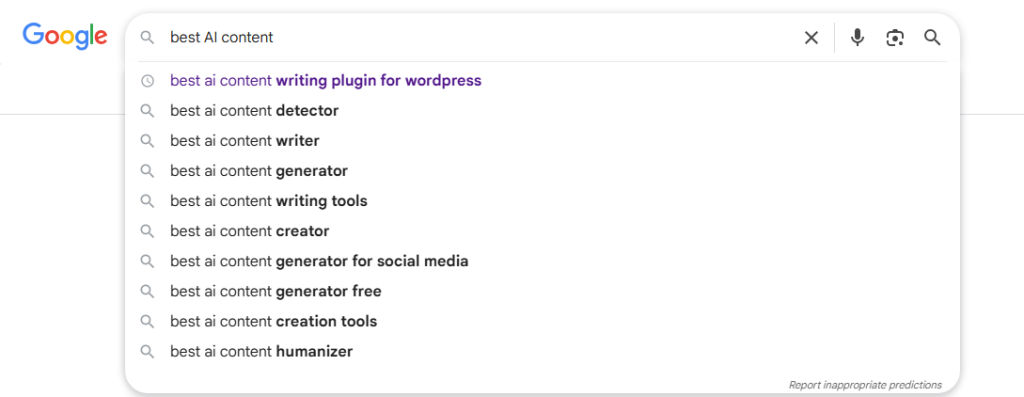
- People Also Ask: When you search for something in the search bar, it shows common questions users have related to your topic. This is also a way to find semantic keywords to optimize your content.
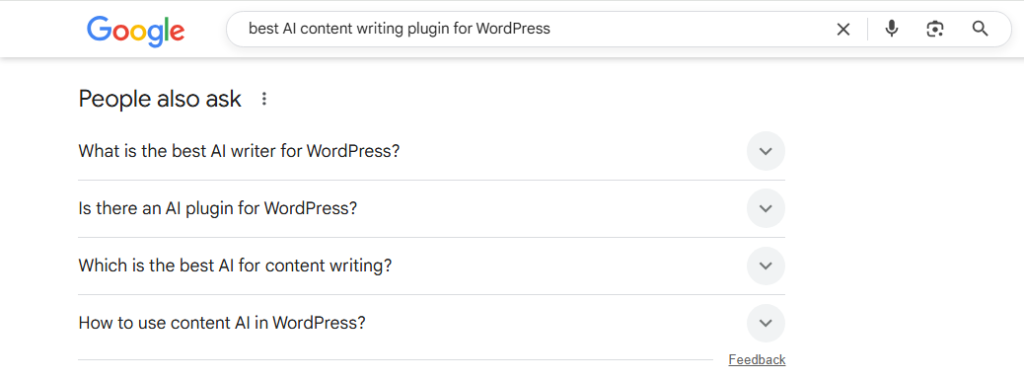
- Related Searches: Google shows more queries related to your search. If you scroll to the bottom of the results page, you’ll find the related searches and get more semantic keyword ideas.
Check out your competitors’ content: Look at the top-ranking pages for your target keyword. What other words, phrases, and subtopics do they cover? This technique can give you excellent insights into the semantic landscape of that topic.
Suppose your target keyword is “AI SEO Writing tool for WordPress”, top-ranking pages might also mention related terms like best AI content writing plugin for WordPress, Competitor content analysis tool for WordPress, keyword research tool for WordPressitp.
Including these semantically related terms in your content can help improve your relevance and rankings.
Wikipedia and Niche forums: These platforms are rich sources of information and related terminology within specific topics. You can explore categories, subheadings, and discussions to uncover semantic connections for your niche.
Using a Tool to Find Semantic Keywords
Brainstorming and manually uncovering things takes time and might be difficult. That’s why the latest AI tools are useful.
Install GetGenie AI and see how to find semantic keywords with it effortlessly.
Installing GetGenie AI
Visit the org. download GetGenie AI, install and activate it.
For details, you can check out this documentation: Pierwsze kroki z GetGenie AI
Find the Keyword Research feature
- Find the Keyword Research feature of GetGenie AI
- Insert your main keyword (We’ve inserted ‘latest marketing trends’)
- Press the button ANALYZE KEYWORD
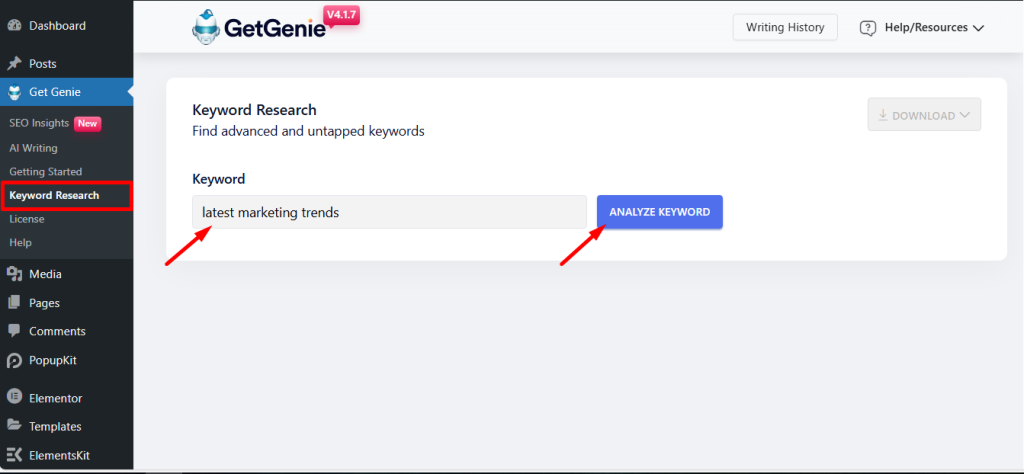
Here you go, our primary keyword was ‘latest marketing trends’, and GetGenie gives data based on it. It indicates that its search volume is 22.60K (SV 22.60K) and the competition level is medium (Comp. 30 (Medium)).
And in the Analyzed Keywords Data section, when you click on the Semantic Keywords tab, it’ll give you the semantically related keywords. It lists a variety of related terms that share contextual meaning with our primary keyword.
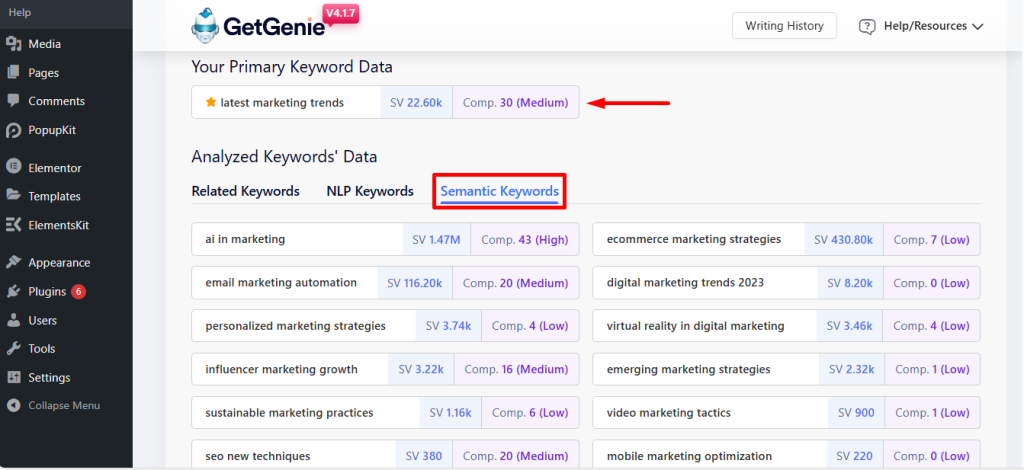
Analyzing the semantic keywords
Let’s break down what you’re seeing in the image:
We’ve picked the first three semantic keywords to analyze the data.
In the screenshot above, we can see each keyword with its corresponding Search Volume (SV) I Competition (Comp..) level.
- ai in marketing: This keyword has an impressive 1.47 million search volume, signaling a massive audience interest.
However, with a high competition score of 43, ranking for this term would be highly challenging. It would require high-quality content and solid SEO efforts. Overall, it’s a high-reward, high-risk keyword.
- email marketing automation: This keyword presents a healthy 116.2K search volume and a more manageable medium competition score of 20.
This suggests a strong opportunity to attract a substantial and relevant audience without facing the same hard fight as the previous term. So, it represents a good balance of traffic potential and achievable ranking.
- Personalized marketing strategies: The search volume of the semantic keyword is 3.74 thousand, but its low competition score of 4 makes this keyword highly attractive.
It’s effective, especially for newer websites or those looking to quickly gain attention. Targeting such low-competition, specific terms can be an excellent strategy for capturing niche traffic and building initial authority.
Easy right? GetGenie AI is a time-saving SEO tool! ✌️

Find your semantic keyword data today!
To enhance your content’s relevancy, semantic keywords clarify your content’s true meaning for search engines. Hope, our guidelines and insights in hand, you can start digging into your semantic terms.
Also, you’re now educated to use the latest tool to save more time and optimize your content strategy smartly.
Discover new potential with confidence!
